Talking About Ethics (Part 3)
Leading in Context
NOVEMBER 6, 2024
Some leaders assume that if… Read More Talking About Ethics (Part 3) But what happens after that? It’s the ongoing dialogue about how to apply those values that brings them to life.
This site uses cookies to improve your experience. To help us insure we adhere to various privacy regulations, please select your country/region of residence. If you do not select a country, we will assume you are from the United States. Select your Cookie Settings or view our Privacy Policy and Terms of Use.
Cookies and similar technologies are used on this website for proper function of the website, for tracking performance analytics and for marketing purposes. We and some of our third-party providers may use cookie data for various purposes. Please review the cookie settings below and choose your preference.
Used for the proper function of the website
Used for monitoring website traffic and interactions
Cookies and similar technologies are used on this website for proper function of the website, for tracking performance analytics and for marketing purposes. We and some of our third-party providers may use cookie data for various purposes. Please review the cookie settings below and choose your preference.
 Ethics Related Topics
Ethics Related Topics 
Leading in Context
NOVEMBER 6, 2024
Some leaders assume that if… Read More Talking About Ethics (Part 3) But what happens after that? It’s the ongoing dialogue about how to apply those values that brings them to life.

Leading in Context
DECEMBER 11, 2024
By Linda Fisher Thornton Managing the ethics of artificial intelligence is only becoming more complex over time, and the stakes are high for finding a path forward. This timely report includes an article I wrote for the EDUCAUSE Review titled Artificial Intelligence and Ethical Accountability. published by EDUCAUSE.
This site is protected by reCAPTCHA and the Google Privacy Policy and Terms of Service apply.

Leading in Context
OCTOBER 30, 2024
By Linda Fisher Thornton Dialogue is a powerful tool for developing ethical organizations. Workplace issues are complex and opinions vary about what ethical leadership means. This combination creates a kind of “murky uncertainty” that keeps leaders from giving us their best, most ethical performance.

Leading in Context
MARCH 12, 2025
By Linda Fisher Thornton The first post in this series,The Missing Domain: Ethical ThinkingexploredWHYleaders need to fill the gap and help people develop ethical thinking. This post will begin to unravelHOWto do that.

Advertiser: ZoomInfo
The art is what you bring to the table—your flair for conversation, your work ethic, your dedication. Sales outreach is an art and a science. We bring the science—proven tactics, strategies, and methods that really work.

Leading Blog
MARCH 8, 2024
A DHERING to an ethical code during challenging times is a standout trait in many historical and present-day leaders that we’ve come to admire. Ethical leaders embody a respect for the sanctity of each individual, regardless of culture, country, race, or religion. However, engaging in ethical issues is a changing realm for leaders.

Leading in Context
OCTOBER 28, 2020
By Linda Fisher Thornton Ethics is fundamentally about acting beyond our own self-interests. Can we be ethical without considering others and acting in ways that benefit them?

Leading in Context
FEBRUARY 3, 2021
By Linda Fisher Thornton How well is your organization navigating the ethical pitfalls of the working world? Why is it so hard to navigate ethical minefields now? If you're finding it to be a major challenge right now, you're not alone. There is currently a "toxic soup" of factors at play.

Leading in Context
JULY 22, 2020
It's the mindset required for important ethical leadership responsibilities such as respect, inclusion, and cultural awareness. By Linda Fisher Thornton Pluralism is required in our leadership thinking because it drives how we treat people and make decisions.

Leading in Context
MAY 26, 2021
By Linda Fisher Thornton Ethical leaders create fear-free work environments, which are foundational in building and maintaining ethical culture and protecting reputation and ethical brand value.

Leading in Context
NOVEMBER 24, 2021
By Linda Fisher Thornton Employers using stretch goals to motivate employees to higher levels of performance need to take note of the ethical risk. If the push for higher performance doesn't come with an emphasis on ethical behavior, it may be encouraging cheating.
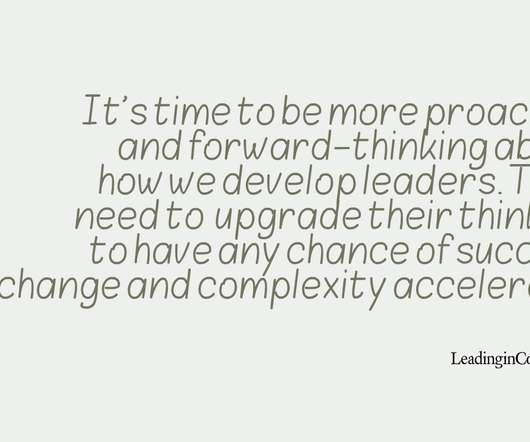
Leading in Context
JULY 21, 2021
By Linda Fisher Thornton Ethical leadership isn't something we can ever say we've fully accomplished. It's not about arriving at any particular place, or about achieving a certain level of knowledge.

Leading in Context
FEBRUARY 26, 2025
By Linda Fisher Thornton Ethical leaders understand that their role revolves around adding value for others, not for themselves. They are careful to avoid taking advantage of situations for personal gain or for the gain of their colleagues or friends.

Leading in Context
OCTOBER 16, 2024
By Linda Fisher Thornton Ethical awareness may have been considered private in the past, but it has become easier to observe in a society that is always socially connected.

Leading in Context
SEPTEMBER 4, 2024
By Linda Fisher Thornton Ethical leadership requires growth, a willingness to acknowledge complexity and an understanding of the broader context in which we lead. Use these resources to improve your ethical awareness and learn about the importance of staying on… Read More Ethical Leaders Adapt (Part 2)

Leading in Context
SEPTEMBER 29, 2022
By Linda Fisher Thornton In Part 1 of this series on Recognizing Ethical Issues, I addressed the gaps in our thinking that require us to develop an ethical alert system. In Part 3, I dug into the importance of ethical awareness as the basis for ethical decision making.

Leading in Context
SEPTEMBER 18, 2024
By Linda Fisher Thornton Ethical leadership requires growth, a willingness to acknowledge complexity and an understanding of the broader context in which we lead. Use these resources to understanding how learning and ethics are connected and how to learn ethical leadership.
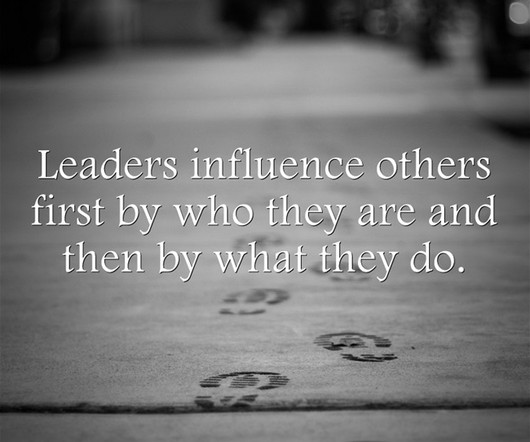
Leading in Context
JULY 24, 2024
By Linda Fisher Thornton Ethical leaders are not easily pulled off course – they stay focused on the values that are important to good leadership. They realize that they are influencing others, and they perceive that as both a privilege and a responsibility.

Leading in Context
MARCH 23, 2022
By Linda Fisher Thornton n How Do You Recognize an Ethical Leader Part 1 and Part 2, I shared 6 special qualities, behaviors and outcomes that define ethical leadership. These are intentional actions ethical leaders take to stay competent as things change around them. This week I'll share three more.
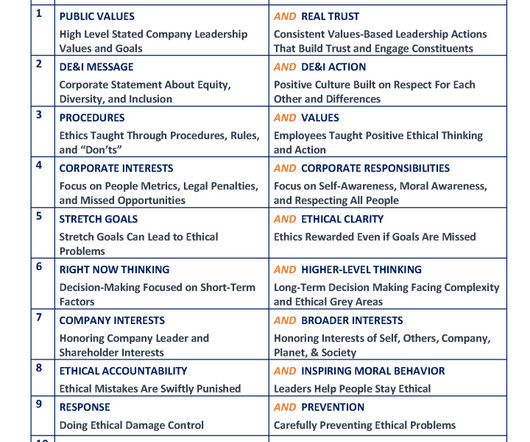
Leading in Context
JUNE 26, 2024
Many global factors are driving changes in ethical leadership expectations, and in high-stakes times, how we handle ethical leadership development can make or break our success. By Linda Fisher Thornton We need to get leadership right because so much depends on it.
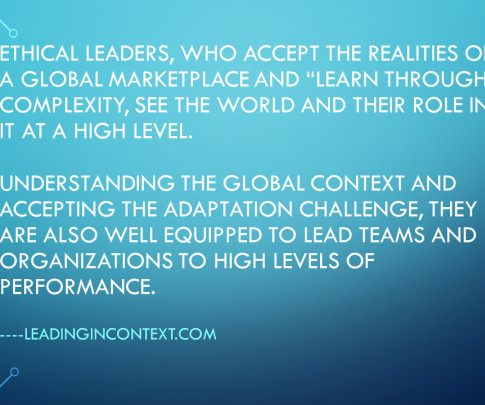
Leading in Context
FEBRUARY 7, 2024
By Linda Fisher Thornton What is Ethical Leadership Development? Ethical leadership development is the ongoing process of guiding leaders to become ethical people and ethical leaders. It is not the same thing as compliance training or following legal requirements, although those are also important.

Leading in Context
DECEMBER 13, 2023
By Linda Fisher Thornton The components of an ethical leadership performance management system are mutually reinforcing and must be closely aligned. If just one element shown on this graphic is missing, then the rest of the components will not work effectively.

Leading in Context
OCTOBER 23, 2024
This complexity and uncertainty combine to create a “murky uncertainty” that may keep people from giving us their best, most ethical performance. By Linda Fisher Thornton Workplace issues are complex and opinions vary about the right thing to do in challenging situations.

Leading in Context
SEPTEMBER 11, 2024
By Linda Fisher Thornton Ethical leadership requires growth, a willingness to acknowledge complexity and an understanding of the broader context in which we lead. Use these resources to learn about how adaptation and ethical leadership are connected and check for learning blind spots.

Leading in Context
DECEMBER 6, 2023
By Linda Fisher Thornton Discouraging Unethical Leadership One of the most important responsibilities of the senior leadership team is to discourage unethical behavior and build an ethical culture.

N2Growth Blog
JANUARY 9, 2025
This vital executive safeguards corporate integrity, ensuring alignment with evolving regulations and fostering a culture devoted to ethical conduct. Decades of executive search experience at N2Growth confirm that top-tier compliance executives balance specialized expertise with a deeply ingrained sense of ethics.

Leading in Context
SEPTEMBER 27, 2023
By Linda Fisher Thornton In Hallmarks of Ethical Leadership (Part 1) I shared 3 special qualities or behaviors that define ethical leadership. These three additional leadership behaviors even more directly impact others in a positive way.

Leading in Context
JUNE 28, 2023
This complexity and uncertainty combine to create a "murky uncertainty" that may keep people from giving us their best, most ethical performance. Leaders may intend to create an ethical culture, but may still have difficulty getting past the murky uncertainty about what ethics means.
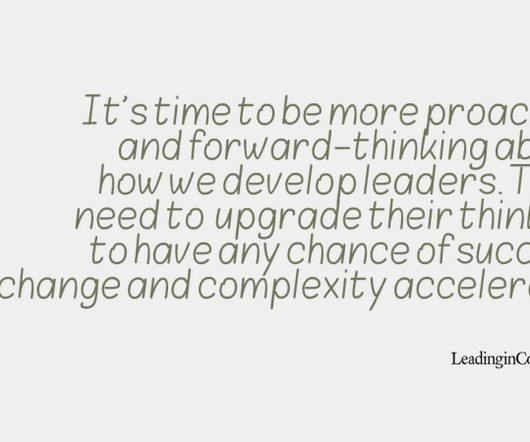
Leading in Context
FEBRUARY 14, 2024
This requires quite a bit more effort than just doing an "annual ethics training." Since ethical leadership itself is multidimensional and nuanced, any ethical leadership development for leaders must be multifaceted and nuanced.

Leading in Context
OCTOBER 11, 2023
In Part 1, Part 2, and Part 3 I explored 9 different traits that help you recognize ethical leaders. One of the hallmarks of ethical leadership is that it is a fear-free zone. By Linda Fisher Thornton This post is Part 4 in a series. In Part 4 I will address the importance of leading in ways that eliminate fear. Fear is insidious.
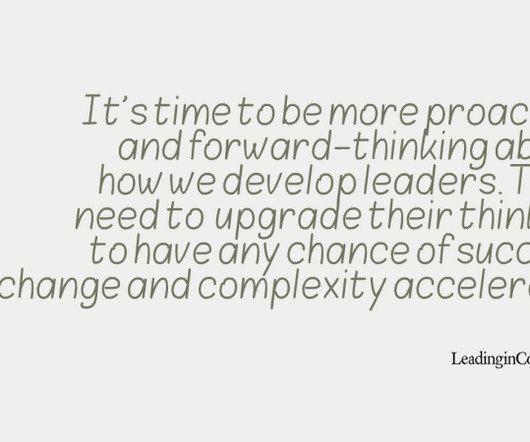
Leading in Context
JUNE 19, 2024
By Linda Fisher Thornton Ethical values can drive positive business results, but only if leaders continually learn and apply better leadership, and stretch to grow. With the bar for expected leadership set so high, it will be a continual career-long stretch for our leaders.

Leading in Context
OCTOBER 2, 2024
By Linda Fisher Thornton Taking the ethical path and showing others the way does not just involve the things leaders do that we can observe. Ethical leaders seek shared value. It also involves the hidden things they do, the mental work they do to make good decisions that add value for others and not just themselves.

Leading in Context
OCTOBER 18, 2023
By Linda Fisher Thornton In Part 5 of this series on attributes of ethical leadership, I explore the importance of really hearing all stakeholders, including those who are not in the room. Here are Part 1, Part 2, Part 3, and Part 4 in case you missed them.

Leading in Context
JULY 5, 2023
By Linda Fisher Thornton While some people think of rights, responsibilities and freedom separately, in a compartmentalized way, I believe they cannot be separated, and according to John Courtney Murray, freedom was always intended to be grounded in ethical values.

Leading in Context
SEPTEMBER 20, 2023
By Linda Fisher Thornton How do you recognize an Ethical Leader? Today I’ll share 3 special approaches to the leadership role that are central to ethical leadership. These are ways that ethical leaders understand their roles and responsibilities in relation to others and world.

Leading in Context
MAY 31, 2023
If leaders don’t seem to care, that numbs the organization’s culture, disabling the natural systems that would prevent and identify ethical risks. In addition to caring about what happens in our own careers, we must CARE about people, about their success, and about creating a positive work environment.

Leading in Context
FEBRUARY 21, 2024
By Linda Fisher Thornton Beyond complying with laws and regulations, what should C-Suite leaders be doing about ethical leadership and responsible business practices? CEOs, CLOs, CHROs and other C-Suite leaders should be working together to ensure that every leader is doing business responsibly and ethically.

Leading in Context
MAY 1, 2024
By Linda Fisher Thornton Developing competent ethical leaders can be a huge challenge. Each role we play and each decision we face has different ethical implications. Each role we play and each decision we face has different ethical implications. Ethical competence is definitely not something that “just happens.”

Leading in Context
MAY 17, 2023
By Linda Fisher Thornton Ethical leadership is about much more than making good decisions and abiding by laws and regulations. One of the elements of ethical leadership that may be overlooked when we view ethics using a “legal lens” is supporting and developing the potential of the people we lead.
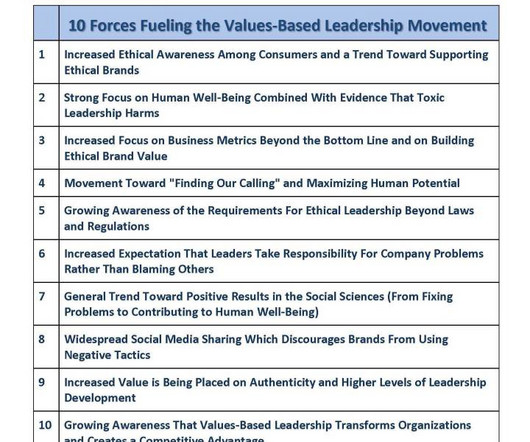
Leading in Context
JUNE 12, 2024
By Linda Fisher Thornton Ethical values are good for business, but only if you keep up as times change. Right now, expectations are high and Ibelieve that values-based leadership is gaining momentum. Recently I was asked to explain why I think so, and I thought I would share my answer in today’s blog post.

Leading in Context
OCTOBER 25, 2023
By Linda Fisher Thornton In Part 1, Part 2, and Part 3 I shared defining characteristics of ethical leadership. In Part 4 I addressed the importance of fear-free leadership. In Part 5 I explored the importance of listening to all stakeholders, including those who are not in the room. In Part 6 let's take a look at the importance of Trust.

Leading in Context
SEPTEMBER 25, 2024
Use these posts about the ethical implications of inclusion to take the next steps on your journey to developing a global mindset broad enough to include all the world's people. By Linda Fisher Thornton We are in the world with others for a reason, and when we embrace the diversity of our global village it makes us all better.
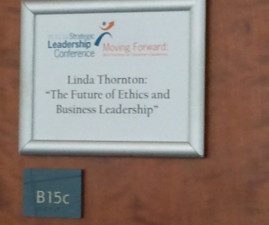
Leading in Context
MARCH 6, 2024
By Linda Fisher Thornton I spoke with Human Resource leaders attending a Richmond SHRM Strategic Leadership Conference about The Future of Ethics and Business Leadership. The lens I used to frame the discussion was leadership development – how we can prepare leaders to lead ethically in a highly complex, connected future.

Leading in Context
JULY 19, 2023
By Linda Fisher Thornton Preparing leaders for ethical leadership is a long-term process. For example, what message are we sending when we separate ethics training from other leadership training? It requires careful thought about the messages we are sending.
Expert insights. Personalized for you.
We have resent the email to
Are you sure you want to cancel your subscriptions?

Let's personalize your content